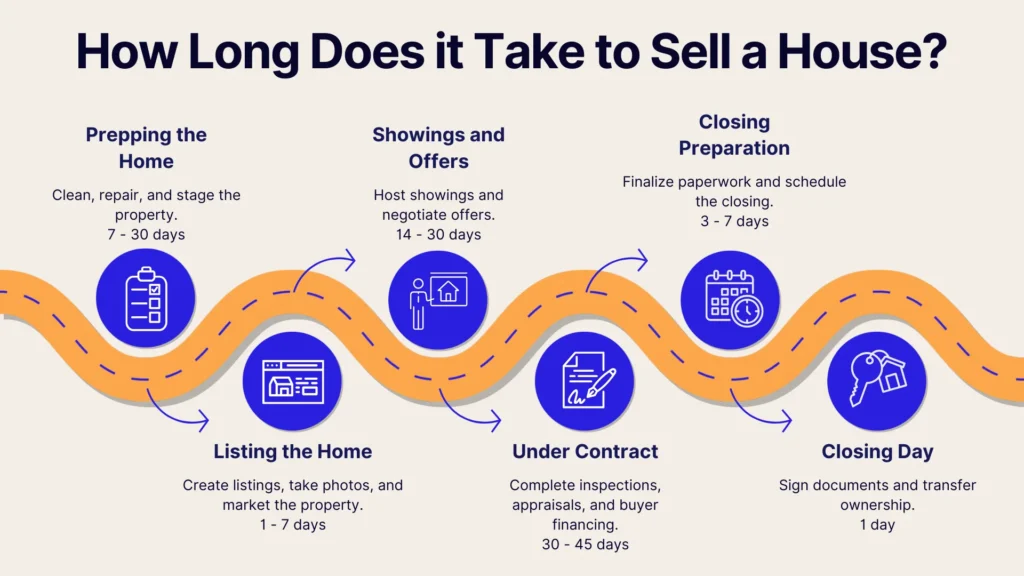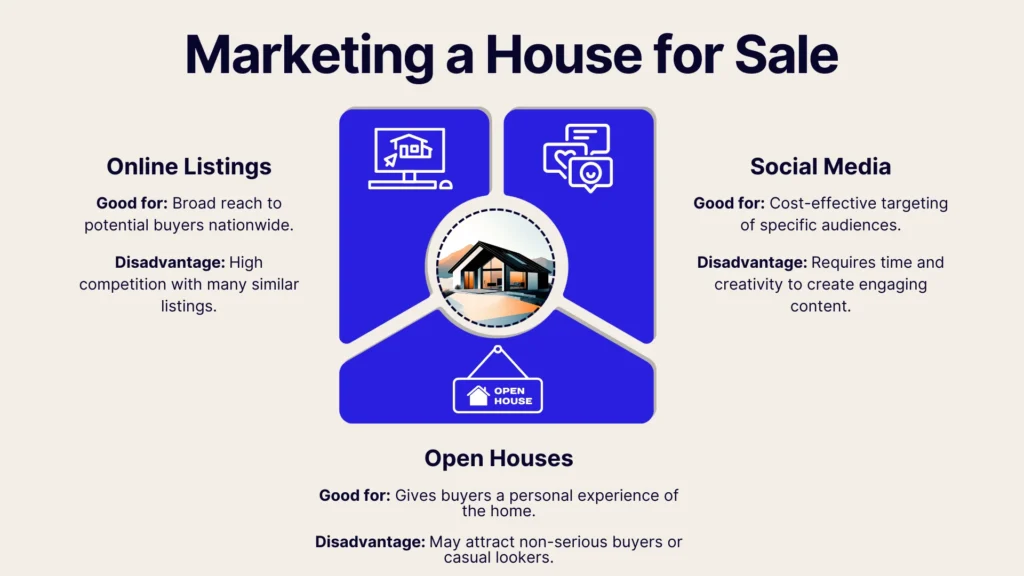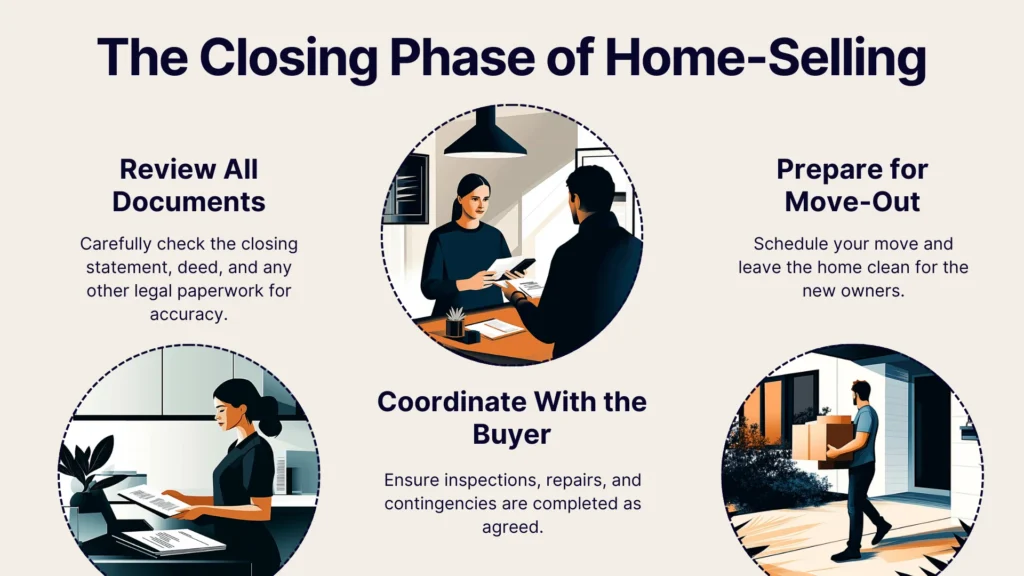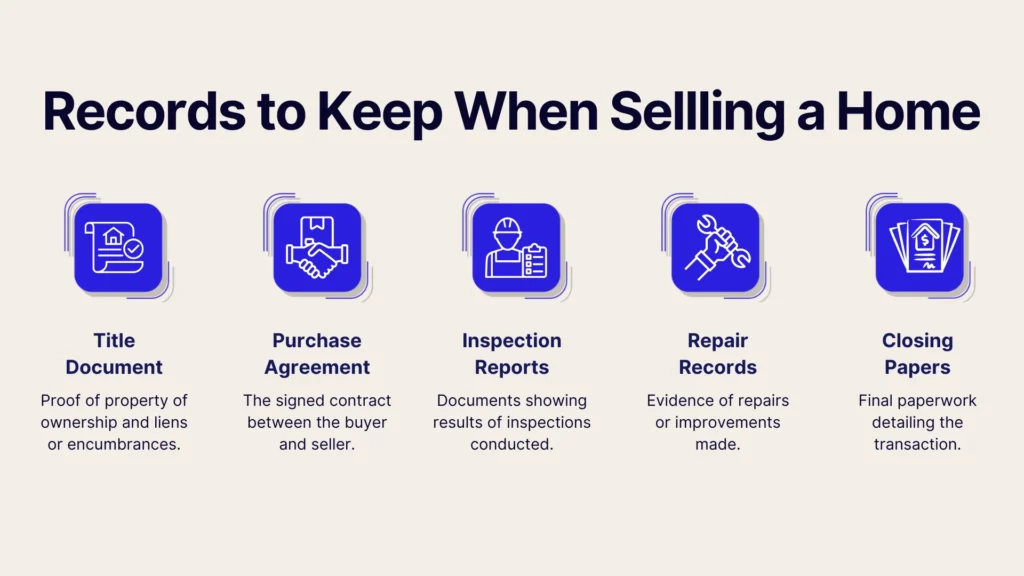Selling a house is a long journey that involves careful planning, attention to detail, and the right decisions, the better to get a smooth and successful transaction. Both first-time sellers and seasoned homeowners need to understand the general timeline of a house sale and the factors that influence it.
Whether it’s the neighborhood, how good your house looks, or how you’ve priced it, all these and more will affect how quickly your home sells. Read on to learn about the various stages of the selling process. We’ll provide insights and tips to help you navigate each phase of your home selling journey with confidence.
What Affects The Timeline For Selling A House?
Many factors can affect how long it takes to sell a house. Sometimes it can go by in a few days; other times, it may stretch to a few months. One way to get an idea is to check how quickly other houses comparable to yours have gone through the selling process. But ultimately, the timeline will be different for every house. We’ll cover a few factors that can affect the timeline.

Location and Neighborhood Desirability
The kind of neighborhood your house is in will be the largest factor. If you’re in a good area, with good access to schools, convenient amenities, and a low crime rate, your house will sell a lot faster than a neighborhood with few schools and higher crime rate. Adjust your timeframe as necessary based on where your house is.
Market Conditions
How the real estate market is doing will also affect your timeline. Lots of houses without many people buying means a buyer’s market, and the selling process may take much longer. Buyers have more choices and more leverage, so they can take their time and decide if they really want your house.
If it’s the other way around, this is known as a seller’s market, where more people are buying but there are fewer houses to go around. The buying process goes a lot quicker as buyers know they’ve got competition and need to act fast.
Pricing Strategy
How you price your home will affect your timeline. Ideally, you should determine the fair market value for your house, because that will get you serious buyers and quicker offers. If you overprice the house, potential buyers may be put off and you won’t get as many offers.
Preparation Phase (2-4 Weeks)
Once you’ve decided to sell your house, it’s time to get ready by pricing your home and preparing any necessary documents. Here are things you should do ahead of time to make the home selling process go a lot quicker:
Research Your Market
Research your market and analyze the conditions. This way, you can set expectations and know what price to set for your house. Once you know what other houses comparable to yours are selling for, you can set a good price for your house and better attract potential buyers.
Determine Your Home’s Value
You also need to get what your home’s actual market value is, to get a better idea of a good listing price. You can do a comparative market analysis, where you check other houses comparable to yours and see how much they sold for. Alternatively, you can also seek professional appraisal, where a licensed or certified professional will examine your house and provide a value for its sale.
Prepare Your Home for Sale
Make sure your home looks its best and has key repairs handled – this prevents buyers from being put off by damaged areas and items. You need to declutter, do some deep cleaning, and address any necessary repairs or upgrades. Depersonalizing your home is another important step that makes your home a blank canvas that potential buyers can visualize themselves living in.
Don’t underestimate the power of deep cleaning when it comes to making a good impression. By making your home tidy and letting its best features shine, you’re more likely to make a quick sale.
Understand Legal Requirements
Selling a house involves various legal requirements, which differ by location. As an FSBO seller, it’s essential to comply with local laws to avoid delays or disputes. Start by understanding property disclosure obligations, which require detailing the home’s condition and any known issues.
You should also review zoning laws, HOA rules, and tax implications, such as capital gains taxes. If you’re unsure about the necessary documents, consult a real estate attorney to ensure a smooth process. Staying informed protects your interests and helps streamline the sale.
Marketing Phase (1-2 Weeks)
The marketing phase is when your home officially goes on the market. This step is crucial to generate interest and attract potential buyers.

Market Your Home
Effective marketing is a must to reach the right audience. Start by taking high-quality photos and videos that showcase your home’s best features. Write an engaging and detailed description highlighting key selling points, such as updated appliances, a spacious backyard, or proximity to amenities. Far too many beautiful properties have gone overlooked simply because their owners don’t know how to sing the virtues of their best features.
Leverage multiple platforms to maximize exposure. List your home on online marketplaces, promote it on social media, and place a “For Sale” sign in your yard. The more visibility your listing receives, the higher the chances of attracting interested buyers.
Showing and Negotiation Phase (2-8 Weeks)
Once your home is on the market, you’ll start receiving inquiries and scheduling showings. During this phase, you’ll also review offers and negotiate terms with potential buyers. Don’t underestimate the benefits of a good showing, as they’re an opportunity to make a strong impression on buyers. Be flexible with scheduling and ensure your home is clean and well-presented before each showing.
Promptly respond to inquiries and communicate effectively with interested buyers to keep them engaged. When you start receiving offers, review them carefully, considering factors like price, contingencies, and closing timelines. If multiple offers come in, weigh the pros and cons of each to determine which one aligns best with your goals. Negotiations may involve counteroffers, so be prepared to compromise while keeping your priorities in mind.
Under Contract Phase (4-8 Weeks)
At this stage, you’ve got offers, and you’re talking to the potential buyer(s). The key phrase at this point is due diligence, on both your end and the buyer’s. You’re not just deciding on which offers to take, you’re also bringing the property in line with what the offer specifies.
Inspections and Appraisals
The buyer will likely schedule inspections and appraisals to confirm the property’s condition and value. Address any issues identified during the inspection promptly to avoid delays. Appraisals ensure the agreed-upon price matches the property’s market value, which is critical for buyers relying on financing.
Clear Contingencies
A contingency is a condition that must be met for the sale to go forward, and if the condition isn’t met, the deal can be canceled. These are very common in real estate, usually stipulating that the buyer has to get financing for the home or the seller has to have a clear title to the home. Whatever contingencies may be in place, work closely with the buyer and their agent to resolve these conditions efficiently.
Ensure Title is Ready
You, as the seller, have to hold the house’s title free and clear, without any liens or disputes about ownership. This is where a title company helps you. You can get the process started before you sell the home, as long as by the time of sale, you have the title clear. This will minimize the amount of legal complications and ensure that the buyer gets undisputed ownership, which protects both parties’ interests in the transaction.
Closing Phase (1-2 Weeks)
The closing phase is the final step in selling your house. During this time, you’ll complete all necessary paperwork and transfer ownership to the buyer.

The buyer will conduct a final walkthrough to confirm the property’s condition aligns with the agreement. Ensure that any negotiated repairs are complete and that the home is in the agreed-upon state.
At closing, both parties sign the required documents to finalize the transaction. This includes the closing disclosure, which outlines all costs associated with the sale. If you mortgaged your house and then paid it off before the sale, a mortgage release will be part of the documents.
Once the paperwork is signed and the payment is transferred, all you have to do is hand the keys over and receive payment to complete the sale.
Post-Sale Phase (Immediately After Closing)
After closing, there are a few final steps to take care of. While you don’t have to take care of these until after the sale, it’s good to know about them beforehand:
Cancel Utilities and Services
Whatever utilities and service accounts you have set up for the now-sold house, either cancel them or have them relocated to your new address. If the latter is an option, make sure that you’re already aware how long a relocation may take or how much notice they need to get things switched over. That’s electricity, water, internet, TV, and anything else that’s tied to your old address.
Canceling your utilities prevents unnecessary charges and lets the new homeowner get set up without any complications. Determine what date you’ll be out of the house, and set your cancellations accordingly to avoid any overlap between you and the new homeowner.
Update Your Address
For those accounts that you aren’t canceling, make sure that you update your address. Examples of whom you should notify include your bank, your credit card company, and any government agencies. This way, you ensure that all correspondence, bills, and statements get to the correct location, saving you stress and confusion.
Keep Records
Keep copies of all documents related to the sale, including the sales contract and closing statement. These records may be needed for tax purposes or future reference. That includes the sales contract, the closing statement, and any correspondence you have with the buyer and/or their real estate agent.

Tips to Accelerate the Timeline
While the timeline for selling a house can vary, there are steps you can take to speed up the process. Here are a few things you can do:
- Price your home accurately. Set a competitive price to attract serious buyers and minimize time on the market.
- Be responsive and flexible. Responding quickly and being flexible with showings will keep potential buyers engaged, and demonstrates that you’re serious about the sale. Catch a buyer early and keep their interest, and they’re less likely to pass up on your home.
- Use professional photography. High-quality photos make a strong first impression and can generate more interest in your listing. Hire a good photographer who will know how to catch the eye of prospective buyers, as the pictures they take will be the first clue prospective buyers have of the property.
These will streamline the selling process and make things run a whole lot faster. The fewer obstacles that you or the buyer have, the faster things will go, and the higher the likelihood of a successful sale.
Conclusion
Selling your house FSBO is a great way to avoid hefty realtor commissions, but it also means managing the details yourself. Pricing, marketing, and staying organized can feel overwhelming without the right tools.
With Propbox, FSBO sales are easier and more efficient. From AI-driven pricing tools to real-time updates, our platform gives you everything you need to sell for more and with less stress while avoiding the 6% fee and staying on a tight timeline. Take the first step toward a smarter sale with Propbox – sign up today!
